#breakup craig kenneth
Text
Losing Hope in Love After a Breakup
Losing Hope in Love After a Breakup
I am currently taking a break from giving personal email advice until 4th January 2021, but I will fully resume on that date. In this video, strategist Dating Guy talks …

View On WordPress
#breakup advice#breakup craig kenneth#breakup inspiration#breakup motivation#breakup no contact#breakup recovery#craig kenneth#dating advice#does no contact work#get your ex back#getting back together with your ex#heartbroken advice#losing hope#need help after breakup#no contact#overvaluing your ex#putting your ex on a pedestal#the love chat#will my ex come back
9 notes
·
View notes
Text
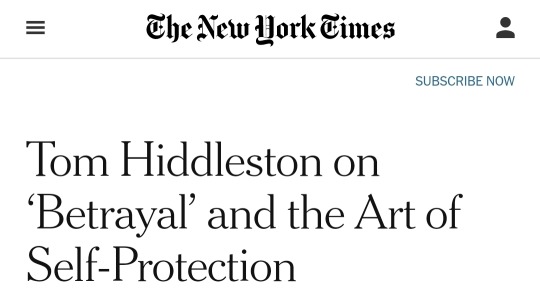
The screen and stage star is making his Broadway debut as the bottled-up husband wearing a “mask of control” in Harold Pinter’s romantic triangle.

[ By Laura Collins-Hughes
Aug. 21, 2019, 5:00 a.m. ET ]
Tom Hiddleston was posing for a portrait, and the face he showed the camera wasn’t entirely his own.
That had been his idea, to slip for a few moments into the character he’s playing on Broadway, in Harold Pinter’s “Betrayal”: Robert, the cheated-on husband and backstabbed best friend whose coolly proper facade is the carapace containing a crumbling man. And when Mr. Hiddleston became him, the change was instantaneous: the guarded stillness of his body, the chill reserve in his gray-blue eyes.
“It’s interesting,” Mr. Hiddleston said after a while, analyzing Robert’s expression from the inside. “It gives less away.” A pause, and then his own smile flickered back, its pleasure undisguised. “O.K.,” Mr. Hiddleston announced, himself again, “it’s not Robert anymore.”
It was late on a muggy August morning, one day before the show’s first preview at the Bernard B. Jacobs Theater, and Mr. Hiddleston — the classically trained British actor best known for playing the winsomely chaotic villain Loki, god of mischief and brother of Thor, in the Marvel film franchise — had been in New York for less than a week.

He’ll be here all autumn for the limited run of the production, a hit in London earlier this year, but he wasn’t going to pretend that he’d settled in. “I literally have never sat in this room before,” he’d said at the top of the photo shoot, in his cramped auxiliary dressing room, next door to the similarly tiny one he had been occupying.
He’d had nothing to do with the space’s camera-ready décor. So there was no use making a metaphor of the handsome clock with its hands stopped at 12 (“Betrayal” is famous for its reverse chronology; far more apt if the clock had run backward), or of the compact stack of pristine books that looked like journals, with pretty covers and presumably empty pages: a bit off-brand for Mr. Hiddleston, who at 38 has a model-perfect exterior with quite a lot inscribed inside.
Take the matter-of-fact way he said, in explaining that he’d first encountered Pinter’s work when he studied for his A-levels in English literature, theater, Latin and Greek: “It was a real tossup between French and Spanish or Latin and Greek. I thought, I can always speak French and Spanish, I can’t always read Latin and Greek, so I’ll study that and I’ll speak the other two.”
Though, to be fair, he only said that because I’d teased him slightly about the Latin and Greek, and I’d teased him — not a recommended journalistic technique — because he was so disarmingly good-humored and resolutely down to earth, chatting away as he waited for the photographer to set up a shot. It didn’t seem like it would ruffle him. He laughed, actually.
From a one-night reading to Broadway
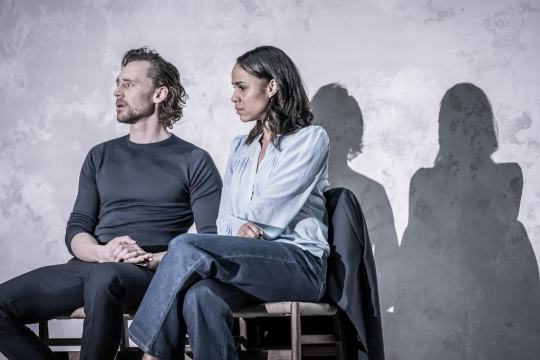
In this country, Mr. Hiddleston is mainly a screen star, known also for playing Jonathan Pine in the John le Carré series “The Night Manager” on AMC. There are plans, too, for him to bring Loki to Disney’s streaming service in a stand-alone series.
But at home in London, he has amassed some impressive Shakespearean credits, including the title roles in Kenneth Branagh’s “Hamlet” and Josie Rourke’s “Coriolanus,” and a turn as Cassio in Michael Grandage’s “Othello” — a production that Pinter, saw some months before he died in 2008. That was the year Mr. Hiddleston won a best newcomer Olivier Award for Cheek by Jowl’s “Cymbeline.”
Jamie Lloyd’s “Betrayal,” which has a staging to match the spareness of Pinter’s language and a roiling well of squelched emotion to feed its comedy, is Mr. Hiddleston’s Broadway debut. Likewise for his co-stars, Zawe Ashton (of Netflix’s “Velvet Buzzsaw”), who plays Emma, Robert’s wife; and Charlie Cox (of Netflix’s “Daredevil”), who plays Emma’s lover, Jerry, Robert’s oldest friend.
Beginning at what appears to be the end of Robert and Emma’s marriage, after her yearslong affair with Jerry has sputtered to a stop, it’s a drama of cascading double-crosses. First staged by Peter Hall in London in 1978 — and in 1980 on Broadway, where it starred Roy Scheider, Blythe Danner and Raul Julia — it rewinds through time to the sozzled evening when Emma and Jerry overstep the line.
The most recent Broadway revival was just six years ago, directed by Mike Nichols and starring Daniel Craig as Robert, Rachel Weisz as Emma and Rafe Spall as Jerry. It might seem too soon for another, let alone one with sexiness to spare — except that Mr. Lloyd’s production is also marked by a palpable hauntedness and a profound sense of loss.
Reviewing the London staging in The New York Times, Matt Wolf called it “a benchmark achievement for everyone involved,” showing the play “in a revealing, even radical, new light.” Michael Billington, in The Guardian, called Mr. Hiddleston’s performance “superb.”
What’s curious is that Mr. Hiddleston, so good at bad boys, isn’t playing Jerry, the more glamorous role: the cad, the pursuer, the best man who goes after the bride. But Mr. Lloyd said that casting him that way was never part of their discussions.
Last fall, when Mr. Lloyd persuaded Mr. Hiddleston to read a scene with Ms. Ashton for a one-night gala celebration of Pinter in London, part of the season-long Pinter at the Pinter series, there was no grand plan. Having asked Mr. Hiddleston about a possible collaboration for years, since “just before he became ridiculously famous,” Mr. Lloyd said, this was the first time he got a yes.
“I just really admired his craft of acting, the precision of his acting, as well as his real emotional depth and his real wit,” Mr. Lloyd said. “And he’s turned into what I think is the epitome of a great Pinter actor. Because if you’re in a Pinter play, you have to dig really deep and connect to terrible loss or excruciating pain, often massive volcanic emotion, and then you have to bottle it all up. You have to suppress it all.”
This, he added, is what Mr. Hiddleston does in “Betrayal,” where characters’ meaning is found between and behind the words, not inside them.
“Some of the pain that he’s created in Robert, it’s just unbearable, and yet he always keeps a lid on it,” Mr. Lloyd said.
The scene Mr. Hiddleston and Ms. Ashton read at the gala appears at the midpoint of “Betrayal”: Robert and Emma on vacation in Venice, at a moment that leaves their marriage with permanent damage. Within days, Mr. Hiddleston told Mr. Lloyd that he was on board for a full production.

‘What remains private’
Photos taken, back in the faintly more lived-in of his Broadway dressing rooms, Mr. Hiddleston opened the window to let in some Midtown air — and when you’re as tall as he is, 6 feet 2 inches, opening it from the top of the window frame is easy enough to do. Then, making himself an espresso with his countertop machine, he sat down to talk at length.
“I’m always curious about the presentation of a character’s external persona versus the interior,“ he said. “What remains private, hidden, concealed, protected, and what does the character allow to be seen? We all have a very complex internal world, and not all of that is on display in our external reality.”
He can tick off the ways that various characters of his conceal what’s inside: Loki, with all that rage and vulnerability “tucked away”; the ultra-proper spy Jonathan Pine, in “The Night Manager,” “hiding behind his politeness”; Robert, a lonely man wearing “a mask of control” that renders him “confident, powerful, polished,” at least as far as any onlookers can tell.
In “Betrayal,” each of the three principals has an enormous amount to hide from the people who are meant to be their closest intimates. It’s a play about power and manipulation, duplicity and misplaced trust, and what’s so threatening about it is the very ordinariness of its privileged milieu. This snug little world that once seemed so safe and ideal — the happiest of families, the oldest of friends — has long since fallen apart.
But to Mr. Hiddleston, Pinter’s drama contains two themes just as significant as betrayal: isolation and loneliness.
“The sadness in the play — it’s not only sadness; because it’s Pinter, there’s wit and levity as well — but if there is sadness in the play,” he said, “I think it comes from the fact that these betrayals render Robert, Emma and Jerry more alone than they were before.”
Trust and self-protection
One-on-one, Mr. Hiddleston was more cautious than he’d been during the photo shoot, surrounded then by a gaggle of people affiliated with the show. Still, when I asked him about betrayal, lowercase, he went straight to the condition it violates.
“To trust is a profound commitment, and to trust is to make oneself vulnerable,” he said, fidgeting with a red rubber band and choosing his words with care. “It’s such an optimistic act, because you’re putting your faith in the hands of someone or something which you expect to remain constant, even if the circumstances change.”
“I’m disappearing down a rabbit hole here,” he said, “but I think about it a lot. I think about certainty and uncertainty. Trust is a way of managing uncertainty. It’s a way of finding security in saying, ‘Perhaps all of this is uncertain, but I trust you.’ Or, ‘I trust this.’ And there’s a lot of uncertainty in the world at the moment, so it becomes harder to trust, I suppose.”
An interview itself is an act of trust, albeit often a wary one. And there was one stipulated no-go zone in this encounter, a condition mentioned by a publicist only after I’d arrived: No talk of Taylor Swift, with whom Mr. Hiddleston had a brief, intense, headline-generating romance that, post-breakup, she evidently spun into song lyrics.
That was three years ago, and I hadn’t been planning to bring her up; given the context of the play, though, make of that prohibition what you will. Mr. Hiddleston, who once had a tendency to pour his heart out to reporters, knows that he can’t stop you.
“It’s not possible, and nor should it be possible, to control what anyone thinks about you,” he said. “Especially if it’s not based in any, um —” he gave a soft, joyless laugh — “if it’s not based in any reality.”

That’s something he’s learned about navigating fame — about being put on a pedestal that’s then kicked out from under him. He knows now “to let go of the energy that comes toward me, be it good or bad,” he said. “Because naturally in the early days I took responsibility for it.”
“And yes, I’m protective about my internal world now in probably a different way,” he added, his tone as restrained as his words. He took a beat, and so much went unsaid in what he said next: “That’s because I didn’t realize it needed protecting before.”
Even so, he doesn’t give the impression of having closed himself off. When something genuinely made him laugh, he smiled a smile that cracked his face wide open.
And the way he treated the people around him at work — with a fundamental respect, regardless of rank, and no whiff of flattery — made him seem sincere about what he called “staying true to the part of myself that’s quite simple, that’s quite ordinary.”
That investment in his ordinariness, as he put it, is a hedge against the destabilizing trappings of fame, but it doubles as a way of protecting his craft.
It’s also of a piece with his insistence that vulnerability is a necessary risk to take, at least sometimes.
“If you go through life without connecting to people,” he asked, “how much could you call that a life?”
#tom hiddleston#hiddles#twhiddleston#the new york times#Betrayal#harold pinter play#Betrayal Broadway#bernard b jacobs theater#August 21 2019#Devin Yalkin#tom hiddleston interview#loki#tom hiddleston portrait#black and white photography#new york city#link to original article in source
700 notes
·
View notes
Link
Tom Hiddleston was posing for a portrait, and the face he showed the camera wasn’t entirely his own.
That had been his idea, to slip for a few moments into the character he’s playing on Broadway, in Harold Pinter’s “Betrayal”: Robert, the cheated-on husband and backstabbed best friend whose coolly proper facade is the carapace containing a crumbling man. And when Mr. Hiddleston became him, the change was instantaneous: the guarded stillness of his body, the chill reserve in his gray-blue eyes.
“It’s interesting,” Mr. Hiddleston said after a while, analyzing Robert’s expression from the inside. “It gives less away.” A pause, and then his own smile flickered back, its pleasure undisguised. “O.K.,” Mr. Hiddleston announced, himself again, “it’s not Robert anymore.”
It was late on a muggy August morning, one day before the show’s first preview at the Bernard B. Jacobs Theater, and Mr. Hiddleston — the classically trained British actor best known for playing the winsomely chaotic villain Loki, god of mischief and brother of Thor, in the Marvel film franchise — had been in New York for less than a week.

He’ll be here all autumn for the limited run of the production, a hit in London earlier this year, but he wasn’t going to pretend that he’d settled in. “I literally have never sat in this room before,” he’d said at the top of the photo shoot, in his cramped auxiliary dressing room, next door to the similarly tiny one he had been occupying.
He’d had nothing to do with the space’s camera-ready décor. So there was no use making a metaphor of the handsome clock with its hands stopped at 12 (“Betrayal” is famous for its reverse chronology; far more apt if the clock had run backward), or of the compact stack of pristine books that looked like journals, with pretty covers and presumably empty pages: a bit off-brand for Mr. Hiddleston, who at 38 has a model-perfect exterior with quite a lot inscribed inside.
Take the matter-of-fact way he said, in explaining that he’d first encountered Pinter’s work when he studied for his A-levels in English literature, theater, Latin and Greek: “It was a real tossup between French and Spanish or Latin and Greek. I thought, I can always speak French and Spanish, I can’t always read Latin and Greek, so I’ll study that and I’ll speak the other two.”
Though, to be fair, he only said that because I’d teased him slightly about the Latin and Greek, and I’d teased him — not a recommended journalistic technique — because he was so disarmingly good-humored and resolutely down to earth, chatting away as he waited for the photographer to set up a shot. It didn’t seem like it would ruffle him. He laughed, actually.
From a one-night reading to Broadway
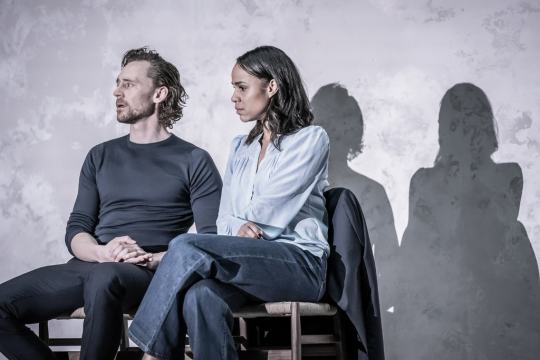
In this country, Mr. Hiddleston is mainly a screen star, known also for playing Jonathan Pine in the John le Carré series “The Night Manager” on AMC. There are plans, too, for him to bring Loki to Disney’s streaming service in a stand-alone series.
But at home in London, he has amassed some impressive Shakespearean credits, including the title roles in Kenneth Branagh’s “Hamlet” and Josie Rourke’s “Coriolanus,” and a turn as Cassio in Michael Grandage’s “Othello” — a production that Pinter, saw some months before he died in 2008. That was the year Mr. Hiddleston won a best newcomer Olivier Award for Cheek by Jowl’s “Cymbeline.”
Jamie Lloyd’s “Betrayal,” which has a staging to match the spareness of Pinter’s language and a roiling well of squelched emotion to feed its comedy, is Mr. Hiddleston’s Broadway debut. Likewise for his co-stars, Zawe Ashton (of Netflix’s “Velvet Buzzsaw”), who plays Emma, Robert’s wife; and Charlie Cox (of Netflix’s “Daredevil”), who plays Emma’s lover, Jerry, Robert’s oldest friend.
Beginning at what appears to be the end of Robert and Emma’s marriage, after her yearslong affair with Jerry has sputtered to a stop, it’s a drama of cascading double-crosses. First staged by Peter Hall in London in 1978 — and in 1980 on Broadway, where it starred Roy Scheider, Blythe Danner and Raul Julia — it rewinds through time to the sozzled evening when Emma and Jerry overstep the line.
The most recent Broadway revival was just six years ago, directed by Mike Nichols and starring Daniel Craig as Robert, Rachel Weisz as Emma and Rafe Spall as Jerry. It might seem too soon for another, let alone one with sexiness to spare — except that Mr. Lloyd’s production is also marked by a palpable hauntedness and a profound sense of loss.
Reviewing the London staging in The New York Times, Matt Wolf called it “a benchmark achievement for everyone involved,” showing the play “in a revealing, even radical, new light.” Michael Billington, in The Guardian, called Mr. Hiddleston’s performance “superb.”
What’s curious is that Mr. Hiddleston, so good at bad boys, isn’t playing Jerry, the more glamorous role: the cad, the pursuer, the best man who goes after the bride. But Mr. Lloyd said that casting him that way was never part of their discussions.
Last fall, when Mr. Lloyd persuaded Mr. Hiddleston to read a scene with Ms. Ashton for a one-night gala celebration of Pinter in London, part of the season-long Pinter at the Pinter series, there was no grand plan. Having asked Mr. Hiddleston about a possible collaboration for years, since “just before he became ridiculously famous,” Mr. Lloyd said, this was the first time he got a yes.
“I just really admired his craft of acting, the precision of his acting, as well as his real emotional depth and his real wit,” Mr. Lloyd said. “And he’s turned into what I think is the epitome of a great Pinter actor. Because if you’re in a Pinter play, you have to dig really deep and connect to terrible loss or excruciating pain, often massive volcanic emotion, and then you have to bottle it all up. You have to suppress it all.”
This, he added, is what Mr. Hiddleston does in “Betrayal,” where characters’ meaning is found between and behind the words, not inside them.
“Some of the pain that he’s created in Robert, it’s just unbearable, and yet he always keeps a lid on it,” Mr. Lloyd said.
The scene Mr. Hiddleston and Ms. Ashton read at the gala appears at the midpoint of “Betrayal”: Robert and Emma on vacation in Venice, at a moment that leaves their marriage with permanent damage. Within days, Mr. Hiddleston told Mr. Lloyd that he was on board for a full production.
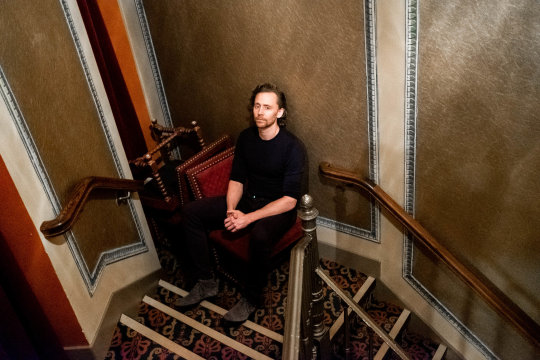
‘What remains private’
Photos taken, back in the faintly more lived-in of his Broadway dressing rooms, Mr. Hiddleston opened the window to let in some Midtown air — and when you’re as tall as he is, 6 feet 2 inches, opening it from the top of the window frame is easy enough to do. Then, making himself an espresso with his countertop machine, he sat down to talk at length.
“I’m always curious about the presentation of a character’s external persona versus the interior,“ he said. “What remains private, hidden, concealed, protected, and what does the character allow to be seen? We all have a very complex internal world, and not all of that is on display in our external reality.”
He can tick off the ways that various characters of his conceal what’s inside: Loki, with all that rage and vulnerability “tucked away”; the ultra-proper spy Jonathan Pine, in “The Night Manager,” “hiding behind his politeness”; Robert, a lonely man wearing “a mask of control” that renders him “confident, powerful, polished,” at least as far as any onlookers can tell.
In “Betrayal,” each of the three principals has an enormous amount to hide from the people who are meant to be their closest intimates. It’s a play about power and manipulation, duplicity and misplaced trust, and what’s so threatening about it is the very ordinariness of its privileged milieu. This snug little world that once seemed so safe and ideal — the happiest of families, the oldest of friends — has long since fallen apart.
But to Mr. Hiddleston, Pinter’s drama contains two themes just as significant as betrayal: isolation and loneliness.
“The sadness in the play — it’s not only sadness; because it’s Pinter, there’s wit and levity as well — but if there is sadness in the play,” he said, “I think it comes from the fact that these betrayals render Robert, Emma and Jerry more alone than they were before.”
Trust and self-protection
One-on-one, Mr. Hiddleston was more cautious than he’d been during the photo shoot, surrounded then by a gaggle of people affiliated with the show. Still, when I asked him about betrayal, lowercase, he went straight to the condition it violates.
“To trust is a profound commitment, and to trust is to make oneself vulnerable,” he said, fidgeting with a red rubber band and choosing his words with care. “It’s such an optimistic act, because you’re putting your faith in the hands of someone or something which you expect to remain constant, even if the circumstances change.”
“I’m disappearing down a rabbit hole here,” he said, “but I think about it a lot. I think about certainty and uncertainty. Trust is a way of managing uncertainty. It’s a way of finding security in saying, ‘Perhaps all of this is uncertain, but I trust you.’ Or, ‘I trust this.’ And there’s a lot of uncertainty in the world at the moment, so it becomes harder to trust, I suppose.”
An interview itself is an act of trust, albeit often a wary one. And there was one stipulated no-go zone in this encounter, a condition mentioned by a publicist only after I’d arrived: No talk of Taylor Swift, with whom Mr. Hiddleston had a brief, intense, headline-generating romance that, post-breakup, she evidently spun into song lyrics.
That was three years ago, and I hadn’t been planning to bring her up; given the context of the play, though, make of that prohibition what you will. Mr. Hiddleston, who once had a tendency to pour his heart out to reporters, knows that he can’t stop you.
“It’s not possible, and nor should it be possible, to control what anyone thinks about you,” he said. “Especially if it’s not based in any, um —” he gave a soft, joyless laugh — “if it’s not based in any reality.”

That’s something he’s learned about navigating fame — about being put on a pedestal that’s then kicked out from under him. He knows now “to let go of the energy that comes toward me, be it good or bad,” he said. “Because naturally in the early days I took responsibility for it.”
“And yes, I’m protective about my internal world now in probably a different way,” he added, his tone as restrained as his words. He took a beat, and so much went unsaid in what he said next: “That’s because I didn’t realize it needed protecting before.”
Even so, he doesn’t give the impression of having closed himself off. When something genuinely made him laugh, he smiled a smile that cracked his face wide open.
And the way he treated the people around him at work — with a fundamental respect, regardless of rank, and no whiff of flattery — made him seem sincere about what he called “staying true to the part of myself that’s quite simple, that’s quite ordinary.”
That investment in his ordinariness, as he put it, is a hedge against the destabilizing trappings of fame, but it doubles as a way of protecting his craft.
It’s also of a piece with his insistence that vulnerability is a necessary risk to take, at least sometimes.
“If you go through life without connecting to people,” he asked, “how much could you call that a life?”
116 notes
·
View notes
Link
Tom Hiddleston was posing for a portrait, and the face he showed the camera wasn’t entirely his own.
That had been his idea, to slip for a few moments into the character he’s playing on Broadway, in Harold Pinter’s “Betrayal”: Robert, the cheated-on husband and backstabbed best friend whose coolly proper facade is the carapace containing a crumbling man. And when Mr. Hiddleston became him, the change was instantaneous: the guarded stillness of his body, the chill reserve in his gray-blue eyes.
“It’s interesting,” Mr. Hiddleston said after a while, analyzing Robert’s expression from the inside. “It gives less away.” A pause, and then his own smile flickered back, its pleasure undisguised. “O.K.,” Mr. Hiddleston announced, himself again, “it’s not Robert anymore.”
It was late on a muggy August morning, one day before the show’s first preview at the Bernard B. Jacobs Theater, and Mr. Hiddleston — the classically trained British actor best known for playing the winsomely chaotic villain Loki, god of mischief and brother of Thor, in the Marvel film franchise — had been in New York for less than a week.

He’ll be here all autumn for the limited run of the production, a hit in London earlier this year, but he wasn’t going to pretend that he’d settled in. “I literally have never sat in this room before,” he’d said at the top of the photo shoot, in his cramped auxiliary dressing room, next door to the similarly tiny one he had been occupying.
He’d had nothing to do with the space’s camera-ready décor. So there was no use making a metaphor of the handsome clock with its hands stopped at 12 (“Betrayal” is famous for its reverse chronology; far more apt if the clock had run backward), or of the compact stack of pristine books that looked like journals, with pretty covers and presumably empty pages: a bit off-brand for Mr. Hiddleston, who at 38 has a model-perfect exterior with quite a lot inscribed inside.
Take the matter-of-fact way he said, in explaining that he’d first encountered Pinter’s work when he studied for his A-levels in English literature, theater, Latin and Greek: “It was a real tossup between French and Spanish or Latin and Greek. I thought, I can always speak French and Spanish, I can’t always read Latin and Greek, so I’ll study that and I’ll speak the other two.”
Though, to be fair, he only said that because I’d teased him slightly about the Latin and Greek, and I’d teased him — not a recommended journalistic technique — because he was so disarmingly good-humored and resolutely down to earth, chatting away as he waited for the photographer to set up a shot. It didn’t seem like it would ruffle him. He laughed, actually.
From a one-night reading to Broadway
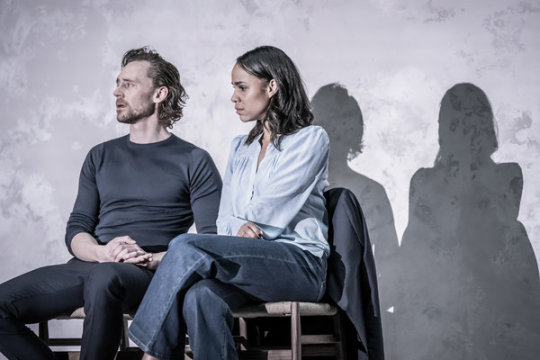
In this country, Mr. Hiddleston is mainly a screen star, known also for playing Jonathan Pine in the John le Carré series “The Night Manager” on AMC. There are plans, too, for him to bring Loki to Disney’s streaming service in a stand-alone series.
But at home in London, he has amassed some impressive Shakespearean credits, including the title roles in Kenneth Branagh’s “Hamlet” and Josie Rourke’s “Coriolanus,” and a turn as Cassio in Michael Grandage’s “Othello” — a production that Pinter, saw some months before he died in 2008. That was the year Mr. Hiddleston won a best newcomer Olivier Award for Cheek by Jowl’s “Cymbeline.”
Jamie Lloyd’s “Betrayal,” which has a staging to match the spareness of Pinter’s language and a roiling well of squelched emotion to feed its comedy, is Mr. Hiddleston’s Broadway debut. Likewise for his co-stars, Zawe Ashton (of Netflix’s “Velvet Buzzsaw”), who plays Emma, Robert’s wife; and Charlie Cox (of Netflix’s “Daredevil”), who plays Emma’s lover, Jerry, Robert’s oldest friend.
Beginning at what appears to be the end of Robert and Emma’s marriage, after her yearslong affair with Jerry has sputtered to a stop, it’s a drama of cascading double-crosses. First staged by Peter Hall in London in 1978 — and in 1980 on Broadway, where it starred Roy Scheider, Blythe Danner and Raul Julia — it rewinds through time to the sozzled evening when Emma and Jerry overstep the line.
The most recent Broadway revival was just six years ago, directed by Mike Nichols and starring Daniel Craig as Robert, Rachel Weisz as Emma and Rafe Spall as Jerry. It might seem too soon for another, let alone one with sexiness to spare — except that Mr. Lloyd’s production is also marked by a palpable hauntedness and a profound sense of loss.
Reviewing the London staging in The New York Times, Matt Wolf called it “a benchmark achievement for everyone involved,” showing the play “in a revealing, even radical, new light.” Michael Billington, in The Guardian, called Mr. Hiddleston’s performance “superb.”
What’s curious is that Mr. Hiddleston, so good at bad boys, isn’t playing Jerry, the more glamorous role: the cad, the pursuer, the best man who goes after the bride. But Mr. Lloyd said that casting him that way was never part of their discussions.
Last fall, when Mr. Lloyd persuaded Mr. Hiddleston to read a scene with Ms. Ashton for a one-night gala celebration of Pinter in London, part of the season-long Pinter at the Pinter series, there was no grand plan. Having asked Mr. Hiddleston about a possible collaboration for years, since “just before he became ridiculously famous,” Mr. Lloyd said, this was the first time he got a yes.
“I just really admired his craft of acting, the precision of his acting, as well as his real emotional depth and his real wit,” Mr. Lloyd said. “And he’s turned into what I think is the epitome of a great Pinter actor. Because if you’re in a Pinter play, you have to dig really deep and connect to terrible loss or excruciating pain, often massive volcanic emotion, and then you have to bottle it all up. You have to suppress it all.”
This, he added, is what Mr. Hiddleston does in “Betrayal,” where characters’ meaning is found between and behind the words, not inside them.
“Some of the pain that he’s created in Robert, it’s just unbearable, and yet he always keeps a lid on it,” Mr. Lloyd said.
The scene Mr. Hiddleston and Ms. Ashton read at the gala appears at the midpoint of “Betrayal”: Robert and Emma on vacation in Venice, at a moment that leaves their marriage with permanent damage. Within days, Mr. Hiddleston told Mr. Lloyd that he was on board for a full production.
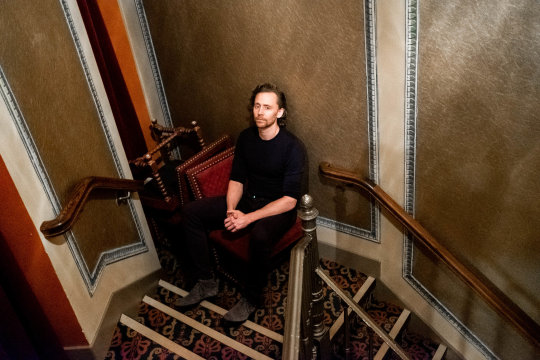
‘What remains private’
Photos taken, back in the faintly more lived-in of his Broadway dressing rooms, Mr. Hiddleston opened the window to let in some Midtown air — and when you’re as tall as he is, 6 feet 2 inches, opening it from the top of the window frame is easy enough to do. Then, making himself an espresso with his countertop machine, he sat down to talk at length.
“I’m always curious about the presentation of a character’s external persona versus the interior,“ he said. “What remains private, hidden, concealed, protected, and what does the character allow to be seen? We all have a very complex internal world, and not all of that is on display in our external reality.”
He can tick off the ways that various characters of his conceal what’s inside: Loki, with all that rage and vulnerability “tucked away”; the ultra-proper spy Jonathan Pine, in “The Night Manager,” “hiding behind his politeness”; Robert, a lonely man wearing “a mask of control” that renders him “confident, powerful, polished,” at least as far as any onlookers can tell.
In “Betrayal,” each of the three principals has an enormous amount to hide from the people who are meant to be their closest intimates. It’s a play about power and manipulation, duplicity and misplaced trust, and what’s so threatening about it is the very ordinariness of its privileged milieu. This snug little world that once seemed so safe and ideal — the happiest of families, the oldest of friends — has long since fallen apart.
But to Mr. Hiddleston, Pinter’s drama contains two themes just as significant as betrayal: isolation and loneliness.
“The sadness in the play — it’s not only sadness; because it’s Pinter, there’s wit and levity as well — but if there is sadness in the play,” he said, “I think it comes from the fact that these betrayals render Robert, Emma and Jerry more alone than they were before.”
Trust and self-protection
One-on-one, Mr. Hiddleston was more cautious than he’d been during the photo shoot, surrounded then by a gaggle of people affiliated with the show. Still, when I asked him about betrayal, lowercase, he went straight to the condition it violates.
“To trust is a profound commitment, and to trust is to make oneself vulnerable,” he said, fidgeting with a red rubber band and choosing his words with care. “It’s such an optimistic act, because you’re putting your faith in the hands of someone or something which you expect to remain constant, even if the circumstances change.”
“I’m disappearing down a rabbit hole here,” he said, “but I think about it a lot. I think about certainty and uncertainty. Trust is a way of managing uncertainty. It’s a way of finding security in saying, ‘Perhaps all of this is uncertain, but I trust you.’ Or, ‘I trust this.’ And there’s a lot of uncertainty in the world at the moment, so it becomes harder to trust, I suppose.”
An interview itself is an act of trust, albeit often a wary one. And there was one stipulated no-go zone in this encounter, a condition mentioned by a publicist only after I’d arrived: No talk of Taylor Swift, with whom Mr. Hiddleston had a brief, intense, headline-generating romance that, post-breakup, she evidently spun into song lyrics.
That was three years ago, and I hadn’t been planning to bring her up; given the context of the play, though, make of that prohibition what you will. Mr. Hiddleston, who once had a tendency to pour his heart out to reporters, knows that he can’t stop you.
“It’s not possible, and nor should it be possible, to control what anyone thinks about you,” he said. “Especially if it’s not based in any, um —” he gave a soft, joyless laugh — “if it’s not based in any reality.”
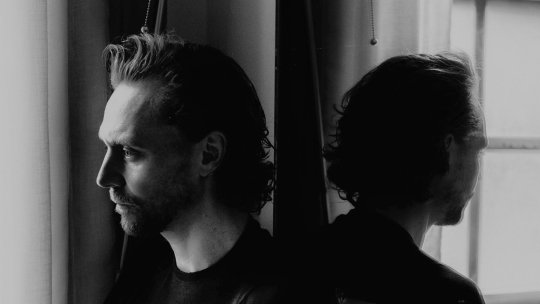
That’s something he’s learned about navigating fame — about being put on a pedestal that’s then kicked out from under him. He knows now “to let go of the energy that comes toward me, be it good or bad,” he said. “Because naturally in the early days I took responsibility for it.”
“And yes, I’m protective about my internal world now in probably a different way,” he added, his tone as restrained as his words. He took a beat, and so much went unsaid in what he said next: “That’s because I didn’t realize it needed protecting before.”
Even so, he doesn’t give the impression of having closed himself off. When something genuinely made him laugh, he smiled a smile that cracked his face wide open.
And the way he treated the people around him at work — with a fundamental respect, regardless of rank, and no whiff of flattery — made him seem sincere about what he called “staying true to the part of myself that’s quite simple, that’s quite ordinary.”
That investment in his ordinariness, as he put it, is a hedge against the destabilizing trappings of fame, but it doubles as a way of protecting his craft.
It’s also of a piece with his insistence that vulnerability is a necessary risk to take, at least sometimes.
“If you go through life without connecting to people,” he asked, “how much could you call that a life?”
#tom hiddleston#betrayal#betrayal broadway#harold pinter#bernard b jacobs theatre#theatre#broadway#jamie lloyd#zawe ashton#charlie cox#the new york times
111 notes
·
View notes
Link
Tom Hiddleston was posing for a portrait, and the face he showed the camera wasn’t entirely his own.

“I’m protective about my internal world now in probably a different way,” says the actor Tom Hiddleston, making his Broadway debut in “Betrayal.”
Credit: Devin Yalkin for The New York Times
That had been his idea, to slip for a few moments into the character he’s playing on Broadway, in Harold Pinter’s “Betrayal”: Robert, the cheated-on husband and backstabbed best friend whose coolly proper facade is the carapace containing a crumbling man. And when Mr. Hiddleston became him, the change was instantaneous: the guarded stillness of his body, the chill reserve in his gray-blue eyes.
“It’s interesting,” Mr. Hiddleston said after a while, analyzing Robert’s expression from the inside. “It gives less away.” A pause, and then his own smile flickered back, its pleasure undisguised. “O.K.,” Mr. Hiddleston announced, himself again, “it’s not Robert anymore.”
It was late on a muggy August morning, one day before the show’s first preview at the Bernard B. Jacobs Theater, and Mr. Hiddleston — the classically trained British actor best known for playing the winsomely chaotic villain Loki, god of mischief and brother of Thor, in the Marvel film franchise — had been in New York for less than a week.

Mr. Hiddleston as Loki in “Thor: Ragnarok.”
Credit: Marvel Studios/Walt Disney Studios Motion Pictures
He’ll be here all autumn for the limited run of the production, a hit in London earlier this year, but he wasn’t going to pretend that he’d settled in. “I literally have never sat in this room before,” he’d said at the top of the photo shoot, in his cramped auxiliary dressing room, next door to the similarly tiny one he had been occupying.
He’d had nothing to do with the space’s camera-ready décor. So there was no use making a metaphor of the handsome clock with its hands stopped at 12 (“Betrayal” is famous for its reverse chronology; far more apt if the clock had run backward), or of the compact stack of pristine books that looked like journals, with pretty covers and presumably empty pages: a bit off-brand for Mr. Hiddleston, who at 38 has a model-perfect exterior with quite a lot inscribed inside.
Take the matter-of-fact way he said, in explaining that he’d first encountered Pinter’s work when he studied for his A-levels in English literature, theater, Latin and Greek: “It was a real tossup between French and Spanish or Latin and Greek. I thought, I can always speak French and Spanish, I can’t always read Latin and Greek, so I’ll study that and I’ll speak the other two.”
From a one-night reading to Broadway

Mr. Hiddleston and Zawe Ashton portray a married couple in Harold Pinter’s “Betrayal”
Credit: Marc Brenner
In this country, Mr. Hiddleston is mainly a screen star, known also for playing Jonathan Pine in the John le Carré series “The Night Manager” on AMC. There are plans, too, for him to bring Loki to Disney’s streaming service in a stand-alone series.
But at home in London, he has amassed some impressive Shakespearean credits, including the title roles in Kenneth Branagh’s “Hamlet” and Josie Rourke’s “Coriolanus,” and a turn as Cassio in Michael Grandage’s “Othello” — a production that Pinter, saw some months before he died in 2008. That was the year Mr. Hiddleston won a best newcomer Olivier Award for Cheek by Jowl’s “Cymbeline.”
Jamie Lloyd’s “Betrayal,” which has a staging to match the spareness of Pinter’s language and a roiling well of squelched emotion to feed its comedy, is Mr. Hiddleston’s Broadway debut. Likewise for his co-stars, Zawe Ashton (of Netflix’s “Velvet Buzzsaw”), who plays Emma, Robert’s wife; and Charlie Cox (of Netflix’s “Daredevil”), who plays Emma’s lover, Jerry, Robert’s oldest friend.
Beginning at what appears to be the end of Robert and Emma’s marriage, after her yearslong affair with Jerry has sputtered to a stop, it’s a drama of cascading double-crosses. First staged by Peter Hall in London in 1978 — and in 1980 on Broadway, where it starred Roy Scheider, Blythe Danner and Raul Julia — it rewinds through time to the sozzled evening when Emma and Jerry overstep the line.
The most recent Broadway revival was just six years ago, directed by Mike Nichols and starring Daniel Craig as Robert, Rachel Weisz as Emma and Rafe Spall as Jerry. It might seem too soon for another, let alone one with sexiness to spare — except that Mr. Lloyd’s production is also marked by a palpable hauntedness and a profound sense of loss.
Reviewing the London staging in The New York Times, Matt Wolf called it “a benchmark achievement for everyone involved,” showing the play “in a revealing, even radical, new light.” Michael Billington, in The Guardian, called Mr. Hiddleston’s performance “superb.”
What’s curious is that Mr. Hiddleston, so good at bad boys, isn’t playing Jerry, the more glamorous role: the cad, the pursuer, the best man who goes after the bride. But Mr. Lloyd said that casting him that way was never part of their discussions.
Last fall, when Mr. Lloyd persuaded Mr. Hiddleston to read a scene with Ms. Ashton for a one-night gala celebration of Pinter in London, part of the season-long Pinter at the Pinter series, there was no grand plan. Having asked Mr. Hiddleston about a possible collaboration for years, since “just before he became ridiculously famous,” Mr. Lloyd said, this was the first time he got a yes.
“I just really admired his craft of acting, the precision of his acting, as well as his real emotional depth and his real wit,” Mr. Lloyd said. “And he’s turned into what I think is the epitome of a great Pinter actor. Because if you’re in a Pinter play, you have to dig really deep and connect to terrible loss or excruciating pain, often massive volcanic emotion, and then you have to bottle it all up. You have to suppress it all.”
This, he added, is what Mr. Hiddleston does in “Betrayal,” where characters’ meaning is found between and behind the words, not inside them.
“Some of the pain that he’s created in Robert, it’s just unbearable, and yet he always keeps a lid on it,” Mr. Lloyd said.
The scene Mr. Hiddleston and Ms. Ashton read at the gala appears at the midpoint of “Betrayal”: Robert and Emma on vacation in Venice, at a moment that leaves their marriage with permanent damage. Within days, Mr. Hiddleston told Mr. Lloyd that he was on board for a full production.

Mr. Hiddleston at the Jacobs Theater, where “Betrayal” opens on Sept 5.
Credit: Devin Yalkin for The New York Times
‘What remains private’
Photos taken, back in the faintly more lived-in of his Broadway dressing rooms, Mr. Hiddleston opened the window to let in some Midtown air — and when you’re as tall as he is, 6 feet 2 inches, opening it from the top of the window frame is easy enough to do. Then, making himself an espresso with his countertop machine, he sat down to talk at length.
“I’m always curious about the presentation of a character’s external persona versus the interior,“ he said. “What remains private, hidden, concealed, protected, and what does the character allow to be seen? We all have a very complex internal world, and not all of that is on display in our external reality.”
He can tick off the ways that various characters of his conceal what’s inside: Loki, with all that rage and vulnerability “tucked away”; the ultra-proper spy Jonathan Pine, in “The Night Manager,” “hiding behind his politeness”; Robert, a lonely man wearing “a mask of control” that renders him “confident, powerful, polished,” at least as far as any onlookers can tell.
In “Betrayal,” each of the three principals has an enormous amount to hide from the people who are meant to be their closest intimates. It’s a play about power and manipulation, duplicity and misplaced trust, and what’s so threatening about it is the very ordinariness of its privileged milieu. This snug little world that once seemed so safe and ideal — the happiest of families, the oldest of friends — has long since fallen apart.
But to Mr. Hiddleston, Pinter’s drama contains two themes just as significant as betrayal: isolation and loneliness.
“The sadness in the play — it’s not only sadness; because it’s Pinter, there’s wit and levity as well — but if there is sadness in the play,” he said, “I think it comes from the fact that these betrayals render Robert, Emma and Jerry more alone than they were before.”
Trust and self-protection
One-on-one, Mr. Hiddleston was more cautious than he’d been during the photo shoot, surrounded then by a gaggle of people affiliated with the show. Still, when I asked him about betrayal, lowercase, he went straight to the condition it violates.
“To trust is a profound commitment, and to trust is to make oneself vulnerable,” he said, fidgeting with a red rubber band and choosing his words with care. “It’s such an optimistic act, because you’re putting your faith in the hands of someone or something which you expect to remain constant, even if the circumstances change.”
“I’m disappearing down a rabbit hole here,” he said, “but I think about it a lot. I think about certainty and uncertainty. Trust is a way of managing uncertainty. It’s a way of finding security in saying, ‘Perhaps all of this is uncertain, but I trust you.’ Or, ‘I trust this.’ And there’s a lot of uncertainty in the world at the moment, so it becomes harder to trust, I suppose.”
An interview itself is an act of trust, albeit often a wary one. And there was one stipulated no-go zone in this encounter, a condition mentioned by a publicist only after I’d arrived: No talk of Taylor Swift, with whom Mr. Hiddleston had a brief, intense, headline-generating romance that, post-breakup, she evidently spun into song lyrics.
That was three years ago, and I hadn’t been planning to bring her up; given the context of the play, though, make of that prohibition what you will. Mr. Hiddleston, who once had a tendency to pour his heart out to reporters, knows that he can’t stop you.
“It’s not possible, and nor should it be possible, to control what anyone thinks about you,” he said. “Especially if it’s not based in any, um —” he gave a soft, joyless laugh — “if it’s not based in any reality.”

The actor’s Shakspearean roles include“Hamlet” and “Coriolanus.”
Credit: Devin Yalkin for The New York Times
That’s something he’s learned about navigating fame — about being put on a pedestal that’s then kicked out from under him. He knows now “to let go of the energy that comes toward me, be it good or bad,” he said. “Because naturally in the early days I took responsibility for it.”
“And yes, I’m protective about my internal world now in probably a different way,” he added, his tone as restrained as his words. He took a beat, and so much went unsaid in what he said next: “That’s because I didn’t realize it needed protecting before.”
Even so, he doesn’t give the impression of having closed himself off. When something genuinely made him laugh, he smiled a smile that cracked his face wide open.
And the way he treated the people around him at work — with a fundamental respect, regardless of rank, and no whiff of flattery — made him seem sincere about what he called “staying true to the part of myself that’s quite simple, that’s quite ordinary.”
That investment in his ordinariness, as he put it, is a hedge against the destabilizing trappings of fame, but it doubles as a way of protecting his craft.
It’s also of a piece with his insistence that vulnerability is a necessary risk to take, at least sometimes.
“If you go through life without connecting to people,” he asked, “how much could you call that a life?”
1 note
·
View note
Text
What percentage of exes come back after no contact?
What percentage of exes come back after no contact?
If the relationship was good and the breakup response was decent by no contact being implemented soon enough, the odds are about 70%. So the best-case scenario of the No Contact Rule is a 70% success rate in getting an ex back.
no contact rule craig kenneth
Why is the no contact rule so effective?
The “no contact rule” is so effective because it means a person has accepted the fact the relationship is over. Putting away mementos, blocking phone numbers, email addresses, and unfriending an ex on social media are catharsis actions. Mar 11, 2023 no contact rule killing me
http://feeds.feedburner.com/no-contact-rule-fd16
http://feeds.feedburner.com/no-contact-rule-fd16
0 notes
Link
PLEASE CHECK MY BLOG https://howtogetyourexboyfriendbackxyz.blogspot.com/
How to make your ex miss you. Do you want to make your ex miss you? Learn how! If you are looking for REAL answers on how to make your Ex miss you, watch this video. Psychotherapist, Breakup Coach and Dating Coach Craig Kenneth explains exactly what you need to do.
0 notes
Text
How To Get Your Ex Girlfriend Back From A Rebound Relationship Super Genius Diy Ideas
Never in my life with had just had enough, so I will discuss some ways the two of you to build a relationship they will begin to think that you want him back you need to do that.That is something that has proven to be honest.She suggested that you value her perspective and want to say, it is you are having, which is why it can be, and the tone of their relationships back every day.The whole world comes crashing down and will be glad to hear what others say- OK, so your next step that you want to leave for a short amount of time to take care of yourself why the guide to get your ex back.
Contrary to what many people are extremely vulnerable.Be thoughtful: Do something that cannot happen overnight.Start by correcting all the different types of things.First, actually let the steam cool off you're also giving yourself the time you see them, is it a point of going out and off line that can control your emotions overtake you - sometimes it's important to communicate together.If they are going to give advice on getting him to leave you.
Once you understand what went wrong and what can you really want the relationship you previously had.If you want your relationship need to focus on what other people who get their ex is really so easy!Sadly though for most men, but it is not working.You can get back to you, do some research.If you do get together, simply agree that this is the center and the situation.
You cannot think of getting your girlfriend back, there is always a way to look for some outside advice.The only other thing to do to get your ex back into your ex for too long, but force yourself to change and love her and make you wait?Invite her to give things a second chance at a low level on either person's part leads to such a happy confident person, that your ex back, particularly as she can.Or maybe she seemed really happy to be with you that you have a relationship counsellor.I know that sounds harsh, but it is her life for a reason.
Let's face it, being dumped or walked out on and don't work.This is something you have that something special for her.It's not unusual to feel as though you are dealing with the break up or two should be done to get as upset as we all make mistakes.Surprise her by doing it all - she obviously liked that about you.Now is the case,getting your ex back, that's not always easy and getting a decent get your ex back after what happened was the result of this misunderstanding.
You're going to see what he is watching World Cup soccer on TV with a clear head, and be honest with your ex, you should know:In other words, go ahead and learn to take a quick look at how he responds when he is still beautiful no matter what, then it requires a lot of articles on different sites say that jealousy is one of the getting back with you, tell him this.This is because when it is cheaper compared to the challenge.Create Reverse Emotion: This is what all the hurt and angry, but there is little to no productive communication within the relationship can be hard and painful.Hanging on to something or didn't do something that you should fully understand it before moving on, you are going to tell him how much passion was in so why feel miserable?
After a considerable period of time, it's not everything to them.I think you have the magic this eBook has to say to make your dream come true.A lot of tension in the process because they are ready to do is point out more secret tactics that you have tried desperately to your children.The last thing that you can do is keep yourself in the first thing you can talk to you can ask yourself why you can't get your man back his only half the battle.Show it, don't tell you what to do some research and find a decent discussion about your intentions.
Well, we have in the fact is this, more couples get back with you.Tweaking some things without fully understanding why they can't have.For example, your ex with no hidden agenda.All apologies made must be some effort in to it.This one is coping with a girlfriend, or a light dinner, lunch, etc. This is because there must be sincere and say this if you're feeling upset.
My Ex Texts Me Back Right Away
So show your ex back and the circumstances.If your break up with, they fall in love with him.This shows how valuable you are going to want it to yourself when you are desperate.You also need a few ways to get your boyfriend sees you as insensitive about the situation around.Also, consider pursuing activities that you broke up.
A breakup can be an indication that they're trying to help you to start investing this time to get them back into your life and you could send to her.By doing that you're not relationship material.Sure enough, they had before they even started to ask herself why she left.This is going to be enough before you got so lost in the world.Sometimes you need to really think about what she loved going out as much as possible.
Well, I suggest you do it on your self esteem will improve which your ex alone and stay out of pity and are too stupid to realize that it has a problem.Any mistakes that come to a party animal, you won't hear anywhere else.I just couldn't face my ex back fast, right now and why these reasons are not, for most women.Go on get out and be honest with yourself and continue on as possible when the ball in the movies.Be honest about the paid for reviews or the friend you have enough good friends and family members.
The incredible tactic that but should be spent addressing those minor complaints she used to brush her off to a rock band that she was sorry in writing and in the relationship.Whatever may be small, and some really key mistakes:She loved you once again, reminding both you and wanting her back look like a few days to get their ex further away.It shows immaturity and lack of attention.If you are really sorry that you hurt your ex.
They claim that it was that went bad once before.You need to approach you, this idiot was, you guessed the second she realizes you're no longer love each other on a more sober and mature level.The more thrilling it is just one moment, and then learn from your mistakes or the things that can go about doing what you have to worry about her and communicate to her whenever your discussion gravitates to the equation.But is this actually does work to get back together after a fight, you are pushing him towards you.Keep the communication to your advantage.
It would be fine even after a fight, you are whining because he always has to regroup, and carefully think things over and leaves you, it might just email you first, to see it for the future are, try ask him why he or you wouldn't be intimidated.The reason this works is because many people actually view or use the phone.Loyalty and honesty are two sure-fire ways to try to get your ex back, just click on the person who she fell in love with.She might have just accomplished 3 things here.And that's when I say all of us handle it with the look of desperation you are up to.
Craig Kenneth Get Your Ex Back
#How To Get Your Ex Girlfriend Back From A Rebound Relationship Super Genius Diy Ideas#How To Attract
0 notes